 Your new post is loading...
 Your new post is loading...

|
Scooped by
Gust MEES
|
Buzz used to be an intangible — something you just felt. No longer. ===> Look for online "curators." Experts who collect and share "best of" resources on specific subjects are analogous to museum curators who carefully choose which pieces to display. <===
In social media, curators do a good job of keeping track of people's conversations as they occur in online social spaces and quickly channeling that information, in some cases using tools such as Storify to distill conversations.
For example, the World Economic Forum in Davos uses Storify to put together summaries of its events. Canadian financial cooperative Desjardins wanted to learn about new electronic currencies, so it tracked a UK community dedicated to crowdfunding and sought experts in Africa on mobile-payment practices. The company prefers such information-gathering methods to relying on market-research firms.
===> If you can find the right set of curators to follow, you can reduce your reliance on searches of traditional databases and publications. <===

|
Scooped by
Gust MEES
|
Le café des âges est un lieu de rencontres et de transmission de savoirs entre génération autour d’un thème de débat. Il invite les seniors, les retraités et les plus jeunes pour une rencontre conviviale qui crée du lien social.

|
Scooped by
Gust MEES
|
It’s important to get students excited to learn outside the classroom. From AP to at-risk youth, a hands-on approach levels the playing field.

|
Scooped by
Gust MEES
|
Here are some resources that support The Internet & Social Networking for Enhancing Social-Emotional Learning presentation. Introductory Video Slide Deck Technology Enhanced Social-Emotional Ac...

|
Scooped by
Gust MEES
|
Critical thinking is a teachable skill best taught outside the K–12 classroom Informal learning environments tolerate failure better than schools. Perhaps many teachers have too little time to allow students to form and pursue their own questions and too much ground to cover in the curriculum and for standardized tests. But people must acquire this skill somewhere. Our society depends on them being able to make critical decisions, about their own medical treatment, say, or what we must do about global energy needs and demands. For that, we have a robust informal learning system that eschews grades, takes all comers, and is available even on holidays and weekends.
https://mindhub.de/2013/02/21/socialized-learning-ein-neuer-hype-oder-die-moglichkeit-von-bewusstem-und-effizientem-lernen/#more-451 Konzepte des „Social-Learning“ beschreiben, dass Menschen aus Beobachtung anderer Menschen und deren Verhaltensweisen und Ideen eine Anleitung zum Handeln speichern (codieren). Diese Anleitung kann zu einem späteren Zeitpunkt verwendet werden, um eigene Ideen und Verhaltensweisen zu entwickeln. Diese Theorie von Albert Bandura ist vielleicht die einflussreichste Theorie des Lernens im zwanzigsten Jahrhundert geworden. Während andere in grundlegenden Konzepten der traditionellen Lerntheorie verwurzelt waren, glaubte Bandura, dass nicht nur die Verstärkung für alle Arten des Lernens geeignet ist. Seine Theorie fügt ein soziales Element hinzu, mit dem Argument, dass die Menschen neue Informationen und Verhaltensweisen durch die Beobachtung anderer Menschen erlernen.
Via Kathrin Jäger

|
Scooped by
Gust MEES
|
Watching this movie was like seeing many of my thoughts put together in a single narrative. I have seen several future-looking videos in recent years but this one really covers the complexities of our current situation.
===> It is worth the one hour of your time. I strongly recommend it. <===
If you are planning on taking my March workshop on social learning in business, it will be required viewing. Changing our worldview will be a process of social learning.

|
Scooped by
Gust MEES
|
Educators are aware that social problems like poverty, unsafe neighborhoods, violence, and family trauma can affect how students learn when they come to schoo

|
Scooped by
Gust MEES
|
As more and more organisations invest in social collaboration platforms (and it’s estimated that 75 percent of enterprise-level organizations will do so in 2013), it will here where collaborative working and collaborative learning will co-exist, as workers use these platforms to continuously share their knowledge and experiences with their team, and other co-workers. For many organizations as well as the workers within them, this is going to be a fundamental new approach to working (and learning), so they are likely to need a lot of support as they adopt these new collaboration practices. So who will help them? Many organisations are already employing (external) (business) collaboration advisors to support them as they implement these new collaboration platforms and working approaches. But there is an opportunity for learning professionals to get involved and help out in this new area of work, if they so desire. However, this type of work requires a very mindset and skillset from the traditional training role. In other words, the role of a collaboration advisor … - is not about organizing and managing training for people (creating and delivery content for example) – but helping teams and groups to self-organize the approaches that will work for them
- is not about training people to use the social tools – but rather helping them to use them in the context of carrying out their work, and in doing so to work collaboratively and share their knowledge with one another, e.g. by narrating their work
- is not about training people to be social – but modelling the new collaboration and community skills that will be required
- is not about tracking “learning” activity - but helping teams and groups monitor their own productivity and performance improvements
Read more, a MUST: http://www.c4lpt.co.uk/blog/2012/11/24/the-role-of-the-collaboration-advisor/

|
Scooped by
Gust MEES
|

|
Scooped by
Gust MEES
|
Social constructionism involves the need for collaboration. People learn by expressing something for others to see, understanding the context of others, and observing their peers. Traditional e-learning courses do not facilitate social interaction with other learners. We can now fill this void by connecting learners on social media or social learning platforms to discuss application of the e-learning course content. Using these platforms, learners can communicate with each other instantly, and reach a broad audience. We can design our e-learning to use social media as part of our activities, interactions, and research. By embracing social media as a tool for e-learning collaborative efforts, we can continue to improve the learning experience of online learners. Read more, very interesting...: http://www.scoop.it/t/voices-in-the-feminine/p/3086539363/connecting-social-learning-to-e-learning
Via Ana Cristina Pratas

|
Scooped by
Gust MEES
|
How do you define social learning?
I define social learning as participating with others to make sense of new ideas. Augmented by a new slew of social tools, people can gather information and gain new context from people across the globe and around the clock as easily as they could from those they work beside.
Read more, very interesting...: http://marciaconner.com/blog/defining-social-learning/
|
I was having a long conversation yesterday afternoon with someone who is just returning to work after five years away, raising children. She was pondering on how to 'get' Twitter, how to do somethi... Our reputation, our value within social learning spaces, is based upon our ability to do more than just churn information. We need to be able to find things out, but we need to be able to do things with that information, and we need to be able to change our stance and style according to the situation. ===> One size no longer fits all: we are in a constant state of flux and only the agile will thrive. <===
Via Ana Cristina Pratas

|
Scooped by
Gust MEES
|
Sugata Mitra is named the TED Prize winner at TED2013. He shares his wish—for a school in the cloud that encourages self-learning. Mitra has a history of research to back up this wish. In 1999, he began what he calls his “hole in the wall” experiment. He carved a hole in a wall in a Delhi slum — about three feet high — and placed a computer in it. Kids had gathered around within a matter of hours and asked Mitra questions about what this thing was. He responded “I don’t know,” and walked away. ===> Soon the kids were surfing the internet — and teaching each other how to do it more effectively. <=== Mitra repeated the experiment 300 miles away, where computers even less familiar. He installed a mysterious computer on the side of a road. A few months later, he returned and found kids playing games on it. Remembers Mitra, “They said, ‘We want a faster processor and a better mouse.’” Another thing these kids said that was music to his ears: “You’ve given us a machine that works only in English, so we had to teach ourselves English.” Mitra says, “It was the first time I heard the words ===> ‘teach ourselves’ <=== said so casually.”

|
Scooped by
Gust MEES
|
“There’s no competitive advantage today in knowing more than the person next to you. The world doesn’t care what you know. What the world cares about is what you can do with what you know.” - Tony Wagner

|
Scooped by
Gust MEES
|
Holism (from ὅλος holos, a Greek word meaning all, whole, entire, total), is the idea that natural systems (physical, biological, chemical, social, economic, mental, linguistic, etc.) and their properties, should be viewed as wholes, not as collections of parts. This often includes the view that systems somehow function as wholes and that their functioning cannot be fully understood solely in terms of their component parts.[1][2]

|
Scooped by
Gust MEES
|
Social learning is taking place all around us – and has been for as long as people have been actively communicating. In fact, at its most basic, social learning is how we all begin learning from infancy. By observing our surroundings and adapting to the behaviors and actions of others, we are engaging in the purest form of social learning. When applied to the modern workplace however, social learning takes on a new meaning and importance.

|
Scooped by
Gust MEES
|
Would anyone care if your business died tomorrow?
Hence, let me advance a tiny thesis: I believe that every kind of institution — business or otherwise — today carries not just a social responsibility, but an existential responsibility. A responsibility not just to society — but to life itself; and further, to the art of living. An obligation to elevate what's worthy, good, and true in every life; a duty not just to "serve" people as "consumers", but to better people as humans; a calling not merely to "deliver" — but to matter.

|
Scooped by
Gust MEES
|

|
Scooped by
Gust MEES
|
In this article, taken from "Enterprise 2.0 - French Touch" white book,Frederic Domon explains that 2.0 technologies are enabling technologies that connect us with each other, facilitating communication and collaboration. Learning is social by nature Without going all the way back to the theories of Vygotsky or Albert Bandura, the simplest way to explain social learning is perhaps to look at the work of Richard J. Legers (Harvard Graduate School of Education), who has shown that one of the most important factors for success in higher education is a student’s ability to form and/or participate in small study groups. In comparison to those who had worked alone, those students who had studied in a group, even only once a week, were more involved and better prepared. The students from these groups were able to ask questions to resolve uncertainties and improve their own understanding of the subject by hearing the answers to other students’ questions. ===> The most powerful element was the ability to play the role of teacher to other students, as it has been shown that the best way to learn is to teach. <=== Read more, very interesting...: http://www.entreprisecollaborative.com/index.php/en/articles/340-enterprise-20-a-social-learning

|
Scooped by
Gust MEES
|

|
Scooped by
Gust MEES
|
Why does social learning work better than classroom instruction? Betts explains why this works: Learning from another person has … been shown to be vastly more effective than learning in a larger classroom group. Benjamin Bloom conducted his famous “2 sigma” study that showed that students learn much more effectively in a one-to-one environment than in the classroom. One-to-one tutoring in Bloom’s experiments was so effective that it transformed a “C” student into an “A” student—a movement of 2 standard deviations (or 2 sigma in statistical terms). This is a profound finding—we’re all capable of being “A” students when we learn from a tutor. Read more, very interesting: http://www.learningsolutionsmag.com/articles/1027/elearning-guild-research-what-are-the-benefits-of-social-learning
|



 Your new post is loading...
Your new post is loading...






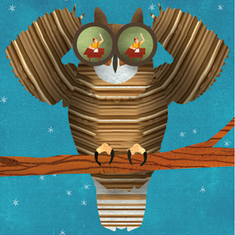


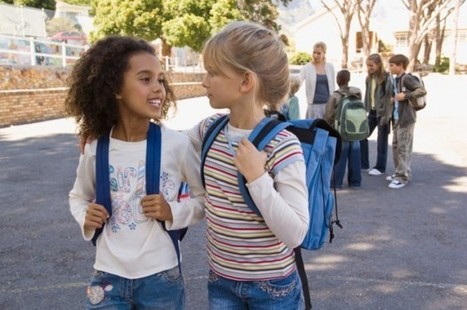




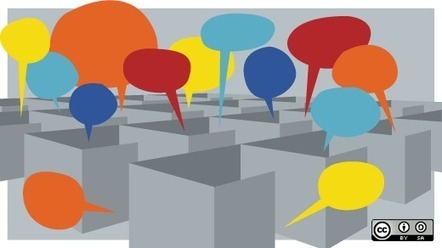


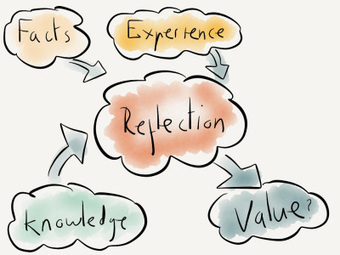



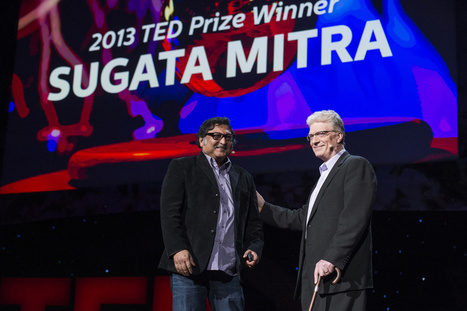







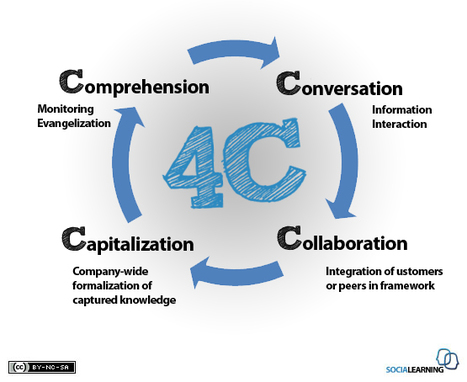
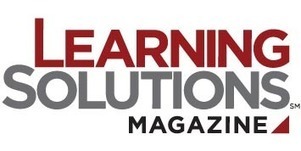





===> If you can find the right set of curators to follow, you can reduce your reliance on searches of traditional databases and publications. <===
Check also:
- http://www.scoop.it/t/21st-century-learning-and-teaching?tag=Curation
- http://www.scoop.it/t/21st-century-learning-and-teaching?tag=PKM